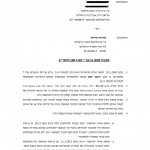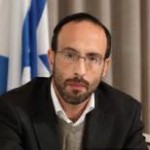Thursday, June 11, 2020, 9:55 Jerusalem Juvenile Magistrates Court Judge Shimon Leybo decided that the Attorney General’s office must transfer to the defense team of the defendants in the “Wedding of Hate”* (see below) case internal expert opinions which state that there were no grounds to prevent Knesset Member Hiba Yazbek from competing in the March 2020 elections, and also any information pertinent to the question of whether or not she would stand trial. Attorney General Avichai Mandelblit permitted Yazbek to compete in the elections and she was not required to stand trial.
The decision by Judge Leybo was made in response to a request by Honenu Attorney Moshe Poleski, who is representing several of the defendants in the “Wedding of Hate” case, for the internal expert opinions to be transferred to him on the grounds that they would be of assistance to his clients. Poleski claimed that the very fact that a criminal investigation was not opened against Yazbek in contrast with the indictment of his clients constituted selective enforcement of the law and a discriminatory policy.
Judge Leybo justified his decision on the basis of an opinion by Attorney General Mandelblit regarding Yazbek which includes a balance between freedom of expression and verbal violence, and specified the importance of the internal expert opinions: “What is lacking for the defense of the defendants is the justification for not opening a case against Yazbek. And why, in relation to the defendants [in the ‘Wedding of Hate’ case], who are minors, the public interest outweighs freedom of expression,” and added that the expert opinions with regard to Yazbek constitute “a framework which reflects a fundamental position with regards to similar cases, and by itself is relevant to the matter at hand.”
Additionally, Judge Leybo mentioned previous rulings which decided that the justification for closing a case in similar situations or with mutual complaints constitute relevant material for the defense of a defendant, and concluded that, “the requested material relates to the conduct of the prosecution (the Attorney General’s office) in the past in relation to similar cases.”
Judge Leybo also noted that the Attorney General’s office did not relate to Poleski’s claim that no investigation had been opened against Yazbek, even though her case was more serious than that of the defendants in the “Wedding of Hate” case. Therefore Judge Leybo decided that the request by Poleski “is relevant to the defense of the defendant and crucial for the continuation of proceedings, and in its absence, a measure of justice will be lacking.” Judge Leybo emphasized that the fact that the Attorney General’s office refrained from opening an investigation against Yazbek despite there being ample evidence and the statement by the Attorney General that her statements were serious and liable to be interpreted as support of armed struggle by a terror organization, obligates the Attorney General’s office to present their reasons to the defense. Also, the Attorney General’s office must present all of the material so that “the entire picture will come clear at once, without the need to complete it from several different sources.”
In the conclusion of his decision, Judge Leybo wrote that due to the crime being judged relating to freedom of expression and the expert opinion of the Attorney General, there is a decisive influence to it, and added, “indeed, the consideration of the Attorney General is also open to judicial review, in a situation in which there has not been an investigation even though he admitted that the expression could be interpreted as ‘support of armed struggle by a terror organization’.”
Therefore Judge Leybo reasoned that in order for the fundamental position of the Attorney General’s office on the matter to be accepted, their explanations concerning Yazbek must be presented, including internal expert opinions: “This correspondence extends beyond the private matter of a particular individual, and rather reflects a policy which is supposed to be constant. It constitutes material relevant to the request at hand.”
Honenu Attorney Moshe Poleski, who is representing the defendants in the “Wedding of Hate” case, welcomed the decision: “This was an unusual and unique decision by the court, which fully accepted the request by the defense, and ordered the transfer to the defense of all of the justifications and the internal expert opinions which had been made in the case of Knesset Member Hiba Yazbek.”
Poleski leveled severe criticism at the Attorney General and at the law enforcement system concerning their handling of statements that Yazbek had publicized: “As we claimed from the beginning, filing an indictment in this case stemmed from the ulterior and unacceptable motives of the prosecution. Despite the fact that no-one disputes that Knesset Member Hiba Yazbek, a known public figure and person of public status, knowingly publicized a great number of statements, which in pratice express explicit identification with notorious terrorists and murderers, statements which in fact add up to a clear crime of incitement to violence and terror, no authority in the law enforcement system thought even to investigate her over the matter. Moreover, the Attorney General engaged in legal acrobatics in order to find tenuous solutions facilitating the authorization of her candidacy for the Knesset, despite the fact that the Knesset Central Elections Committee itself had disqualified her from competing.
“However now that the matter at hand concerns several youths who danced at a private wedding and spontaneously held a sign for mere seconds, the law enforcement authorities have rushed to bring them to trial. It is all only to divert public attention from the unparalleled heavy-handed and abusive interrogation methods which were used on suspects in the Kfar Duma case. Thus in the end a large number of suspects were served with baseless indictments for incitement to violence.”
Honenu Attorney Moshe Poleski concluded: “The court explicitly mentioned in its decision that the claim of the petitioner’s attorney according to which an investigation was not opened despite the fact that Knesset Member Yazbek’s case was more serious than the acts of the defendants in the “Wedding of Hate” case, is a claim which did not receive a reply from the prosecution. By the decision of the court, it seems that also they were surprised by the incomprehensible discrimination with regards to the defendants in this case in contrast with the treatment in other cases. We hope that in the end also the decision handed down in this case will be in accordance with [the other cases].”
* At a December 2015 wedding, participants were seen waving weapons and photographs of the infant who died in the July 2015 arson incident in Kfar Duma. The wedding became known as the “Wedding of Hate”. See here and here for two instances of central evidence lost by the police in the “Wedding of Hate” case, and here for a false detention in the case, for which the detainee received compensation.


